Louisiana FASD Summit 2023
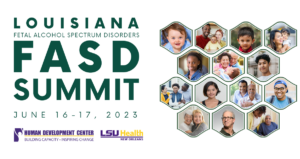
Join the Human Development Center at the LSU Health Sciences Center for an educational workshop featuring national experts, families, and self-advocates with Fetal Alcohol Spectrum Disorders (FASD).
June 16-17, 2023 from 8:30 am – 5:00 pm
Human Development Center
411 S. Prieur St. New Orleans, LA 70112
Attend the summit in-person or virtually! Register for virtual attendance here.
Topics will include:
- Prevalence and identification of FASD
- Strategies to support learning and mental health challenges
- Lived experience of families and self-advocates with FASD
The Louisiana FASD Summit is free. However, please consider donating funds to the Human Development Center Foundation to defray costs of the FASD Summit and support future efforts to address FASD in Louisiana. Make a donation here.
About FASD
The World Health Organization and US Centers for Disease Control (CDC) have identified Fetal Alcohol Spectrum Disorders (FASD) as the leading cause of developmental disabilities in the world and U.S. According to the CDC, approximately 1 in 20 school-age children have an FASD, causing developmental delays as well as physical and mental health challenges.
FASD is the umbrella term for conditions that can occur from prenatal alcohol exposure (PAE). PAE can cause, among many things, inconsistent development, learning difficulties, poor impulse control, and problems with memory and executive functioning.
The Human Development Center (HDC) at LSU Health New Orleans has identified Fetal Alcohol Spectrum Disorders (FASDs) as an unaddressed need in Louisiana. We hope to enlist input and participation from agencies, families, individuals with FASD, and others who may be able to contribute to and benefit from enhanced services for individuals with FASD and their families/caretakers.
Participation Stipend
Louisiana residents with FASD or their immediate family, including adoptive and foster parents, may apply for a participation stipend for the Louisiana FASD Summit. To qualify, recipients must:
- show proof of Louisiana residency
- attend all Summit sessions and the Engagement Planning meeting on Saturday afternoon
Payment will be mailed after the FASD Summit. One stipend is available per qualifying family unit. Limited stipends available. Email HDCinfo@lsuhsc.edu to apply for the participation stipend.
Thank you to our sponsors!

The Florida Center Training Institute is committed to providing resources for FASD families. The institute is also working with the Families Moving Forward (FMF) Program to deliver Families Moving Forward (FMF) Specialist Training across the country.
The FMF Specialist Training is a six-day course that teaches professionals to deliver the scientifically validated FMF Program intervention, an evidence-based intervention clinically proven to help families, and their children, ages 3-13 years, living with prenatal alcohol exposure (PAE) or fetal alcohol spectrum disorders (FASD). Become a forerunner on this mission! Learn more about the training here.
If you’re interested in sponsoring the Louisiana FASD Summit, email jrob44@lsuhsc.edu.
Continuing education units (CEUs)
CEUs are available to Occupational Therapists who attend the summit in-person. Attendees will only get credit for the hours attended.
The Louisiana FASD summit has not been approved for social work CEUs at this time. However, you can use the “Guide for Assessment for Continuing Education” form, which will determine if you can use the training toward your CE requirement. If the training passes the guide, you will upload the completed guide with the certificate into your renewal application. For more questions, you can email socialwork@labswe.org.
Agenda
Friday, June 16, 2023
| Time | Event/Topic | Speaker |
| 7:45-8:30 | Registration & Continental Breakfast | |
| 8:30-8:40 | Welcome | Dr. Philip Wilson |
| 8:40-8:50 | Opening Comments | Dr. Kenneth Jones |
| 8:50-10:05 | FASD: Initiating New Energy for, and Attention to, FASD in Louisiana | Dr. Philip May |
| 10:05-10:15 | MORNING BREAK | |
| 10:15- 11:30 | Building Capacity for FASD Diagnosis &Care | Dr. Lynn Cole and Mrs. Tiffany Lepard Tassin |
| 11:30- 12:30 | LUNCH | |
| 12:30-1:30 | Moving Forward: Ideas from Research for Creating FASD-Informed Care | Dr. Heather Carmichael Olson |
| 1:30-2:45 | Parent Perspectives, Support Needs & Lessons from Lived Experience | Facilitator: Dr. Emily Rusnak Panelists: Mrs. Tiffany Lepard Tassin, Ms. Kathy Mitchell, Dr. Krista James |
| 2:45-3:00 | AFTERNOON BREAK | |
| 3:00-4:15 | Creating Effective Home and School Environments for Individuals with FASD | Dr. Krista James & Ms. Ali Kowitz |
| 4:15-4:30 | Summary, Evaluations & Wrap up | Mr. David Deere |
| 4:50-6:00 | RECEPTION |

Saturday, June 17, 2023
| Time | Event/Topic | Speaker |
| 8:00-8:30 | Coffee, Tea, Juice | |
| 8:30-8:40 | Welcome | Dr. Philip Wilson |
| 8:40-10:05 | From Theory to Success!: Cultivating Positive Outcomes for the FASD Community | Dr. Emily Rusnak |
| 10:05-10:15 | MORNING BREAK | |
| 10:15- 11:30 | Self-Advocate Perspectives and Lessons Learned from Lived Experience | Facilitator: Mr. David Deere Panelists: Ms. Rebecca Tillou (NY), Ms. Emily Hargrove (KY), Ms. Helen Simpson (OR) |
| 11:30-11:45 | Summary, Evaluations & Wrap up | Ms. Nadia Johnson |
| 11:45-1:30 | LUNCH (For guests & speakers staying for the Engagement Building session) | |
| 1:30-4:30 | Engagement Building | Mr. David Deere, Facilitator |

Meet the speakers
Initiating new energy and attention for FASD: A vital and needy orphan topic
Time: Friday, June 16, 2023 at 8:50 am
Speaker: Philip May, Ph.D.
Philip A. May, Ph.D. is an expert in the epidemiology of Fetal Alcohol Spectrum Disorders (FASD) and has published numerous papers on the epidemiology of FASD in South Africa, The United States, and Italy.
Dr. May has conducted extensive research on the epidemiology and risk factors for FASD, including inventories of the population-based traits of children within all four diagnoses of FASD, maternal risk factors, and maternal health factors such as dietary intake, maternal BMI, childbearing history, alcohol use biomarkers, and socioeconomic status. He has received funding from the National Institutes of Health (NIH), specifically the National Institute on Alcohol Abuse and Alcoholism (NIAAA), over the past 25 years. Dr. May was formally trained in demography, social epidemiology, and population studies. He and his clinical research team focus much of their research on the epidemiologic discovery of etiology, diagnosis of the full continuum of FASD, targeted opportunities for community-wide prevention, and programs of intervention.
This bio was found on The University of North Carolina at Chapel Hill’s Nutrition Research institute. Read the original bio here.
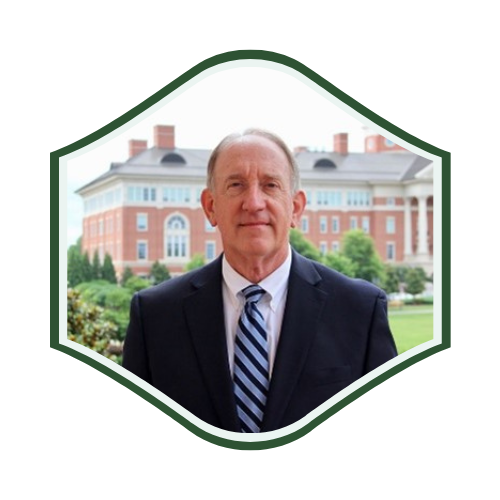
Moving Forward: Ideas from Research for Creating FASD-Informed Care
Time: Friday, June 16, 2023 at 10:15 am
Speaker: Heather Carmichael Olson, Ph.D.
Heather Carmichael Olson, PhD is a clinical and developmental psychologist based at the University of Washington. She carries out research, provides community education to a broad range of audiences, trains graduate and postgraduate students, works on public policy– and has served as a clinician with children and families for many years. Her main interests are fetal alcohol spectrum disorders (FASD), early childhood mental health, and interventions for children born prenatally exposed to alcohol and other drugs and their families.
A main research focus has been the Families Moving Forward (FMF) Program, a family-focused FASD intervention, now being disseminated primarily in the USA and Canada. The standard FMF Program is also being translated into a mobile health application, called FMF Connect, for even broader use. To help in FASD intervention, development is underway on other helpful products for providers and families that are all based on the FMF Program.
Through Seattle Children’s, Dr. Olson co-directs a service focused on assessment and short-term consultation for youth with prenatal alcohol and drug exposure, and their families. Dr. Olson also offers mental health services to a broad range of young children and develops research focused on early childhood mental health.
A full biography can be found at the University of Washington School of Medicine’s Psychiatry & Behavioral Sciences. Read the full bio here.
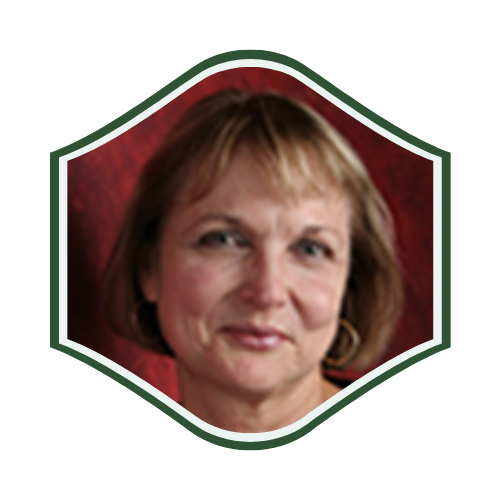
Parent Perspectives, Support Needs, & Lessons from Lived Experience
Time: Friday, June 16, 2023 at 12:45 pm
Facilitator: Ms. Jenn Wisdahl
A newer member to the FASD United (formerly NOFAS) team, Jennifer Wisdahl leads the FASD United legislative and policy agenda and supports internal operations as the Chief Operating Officer. She trains members of the FASD community to serve as advocates and works with policymakers to advance FASD legislation. In 2021, Jenn coined federal legislation the “FASD Respect Act.” Jenn founded the Stars for Starla youth recognition program at FASD United and joined self-advocate Rebecca Tillou in creating Run FASD, a now international virtual 5k raising awareness of FASD.
Jenn was an executive producer on the award-winning short film “The FASD Project,” is a member of the Board of Directors of the FASD United Washington State affiliate and is a proud parent to 3 young adults with FASD. Prior to her work with FASD United, Jenn worked in the HR, recruitment and management sector for many years as well as volunteered heavily with Scouts Canada, various trade associations, and school groups.
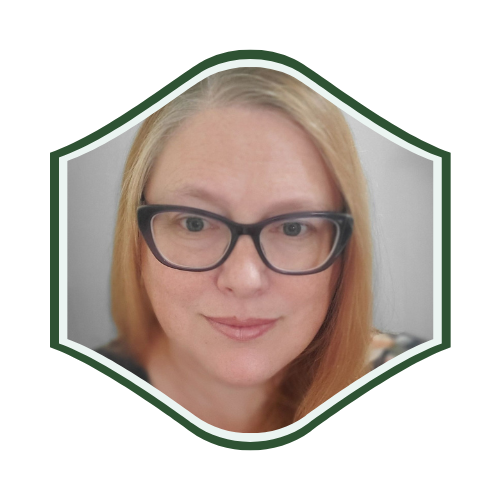
Panelist: Kathleen T. Mitchell, MHS, LCADC
Kathleen T. Mitchell, MHS, LCADC served as Vice President and Spokesperson for FASD United (formerly the National Organization on Fetal Alcohol Syndrome-NOFAS) for 24 years. She is a noted invited speaker on Fetal Alcohol Spectrum Disorders (FASD), Women and Addiction and Stigma and has presented for over three decades both nationally and globally. She holds a Master of Human Services (MHS) degree and is a licensed clinical alcohol and drug counselor (LCADC). She served as principal investigator (PI) and project officer for government projects that aimed to prevent FASD, reduce stigma and support families and individuals living with FASD.
In 1990, Kathy testified to Congress at the first hearing on FAS/FAE and in 1992 and 1994 she testified at hearings that later resulted in warning labels on all alcohol products. She served on the special committee of the World Health Organization (WHO) developing guidelines for the identification and management of substance use disorders in pregnancy and in 2019 presented FASD: A Vision for the Future at the WHO 2nd Alcohol Forum. She was the chief executive officer of Montgomery County, Maryland addiction contracted services overseeing detox, in-patient, out-patient and programs for pregnant women with substance use disorders and their children.
Kathy taught electives and health seminars on FASD and Addiction at both Georgetown and Northwestern University Medical Schools. She has co-authored or authored twenty-three published papers, and authored handbooks, chapters and curricula on addiction, stigma and FASD. She served as an FASD expert and advised the writers of NBC’s Law and Order; Special Victims Unit to create an episode about FASD. She has been featured in documentaries, news stories, television and other media including: The Doctors (CBS), NBC’s Later Today Show, Self Magazine, Glamour Magazine, BBC Radio, and National Public Radio. In 2016 the Washington Post covered her story and by day three it had been viewed over 8.7 million times, was posted to over 20 other unique websites around the world and trended as the #6 topic on Facebook.
In 2004, Kathy founded the international birth mother mentorship program, the Circle of Hope (COH) and in 2020 founded Recovering Mothers Anonymous (RMA). She continues to speak at conferences and provides training and support to members of the COH speakers bureau that partners with the American College of Obstetricians and Gynecologists (ACOG) to provide grand rounds to medical facilities across the U.S.
Ms. Mitchell is available for trainings, faculty or patient consultation, or consultation on special projects. ktmitchellconsulting@gmail.com
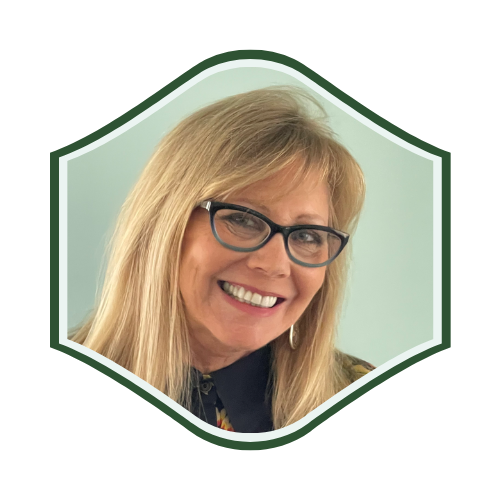
Panelist: Dr. Emily Rusnak
Emily Rusnak, Ph.D., CCC-SLP and her husband, Bill, are parents to a young adult with an FASD. Read her full bio in Friday’s session “Creating Effective Home and School Environments for Individuals with FASD.”
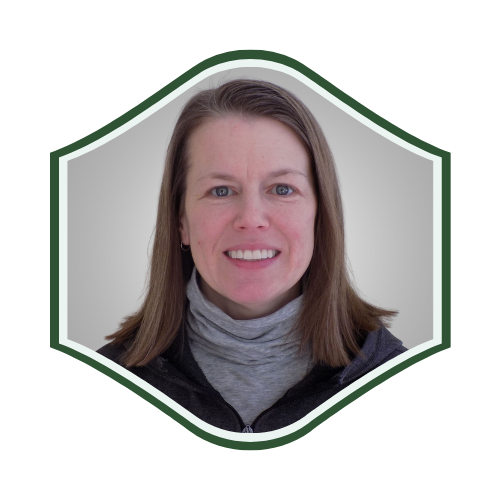
Panelist: Tiffany Lepard Tassin, M.S., C.G.C.
Tiffany Lepard Tassin, M.S., C.G.C. has two sons with an FASD (ages 8 and 9). Read her full bio in Saturday’s session “Building capacity for FASD diagnosis & care.”
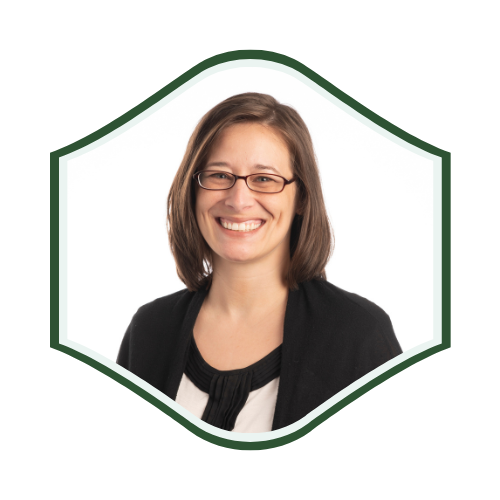
Creating Effective Home and School Environments for Individuals with FASD
Time: Friday, June 16, 2023 at 2:00 pm
Speaker: Krista James, Ph.D.
Krista James, Ph.D. has worked with students and teachers for the last 20 years as a special education teacher, autism specialist, administrator, and professor. She is also a mom to 7, 4 of which are adopted, and 3 have FASD. Krista previously worked with the State of Alaska on implementing their FASD awareness and education campaign. Krista currently works at the Human Development Center’s Louisiana Autism Spectrum and Related Disabilities Project (LASARD) as a facilitator.
Krista has a B.S. and M.Ed. in Special Education from Wilmington University, and an Interdisciplinary Ph.D. in Education, Leadership, & Cross-Cultural Studies from the University of Alaska Fairbanks. She has recently moved back to the United States after living and working in International Schools in Cambodia, Guatemala, and Italy.
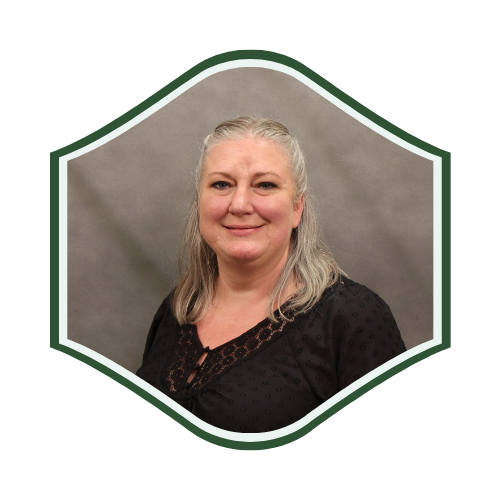
Speaker: Ali Kowitz, M.Ed., ET/P
Ali Kowitz, M.Ed., ET/P is a Facilitator for the LSUHSC Human Development Center’s LASARD Project. She received her Bachelor of Science – Elementary Education degree from Louisiana State University (Geaux Tigers!) in 2007. In 2012, she received a Master of Education – Special Education (grades 1-12) from Northwestern State University. Prior to joining the HDC, Ali worked as a Special Education Teacher (inclusive and resource settings), Special Education Coordinator, Section 504 Coordinator, PBIS Chair, SBLC Chair, and IEP Facilitator in St. Tammany Parish.
Additionally, Ali is an Educational Therapist and focuses on helping children and adults with ADHD, learning disabilities, and executive functioning skills. Ali is an advocate for inclusive practices and is passionate about working with schools to build inclusive and accessible environments for all learners.
When she’s not at work, you can find Ali out on the water (boating or paddle boarding); doing other outdoorsy stuff; and, hanging out with her family, two dogs (Louie and Echo), and Cactus – the Bearded Dragon.
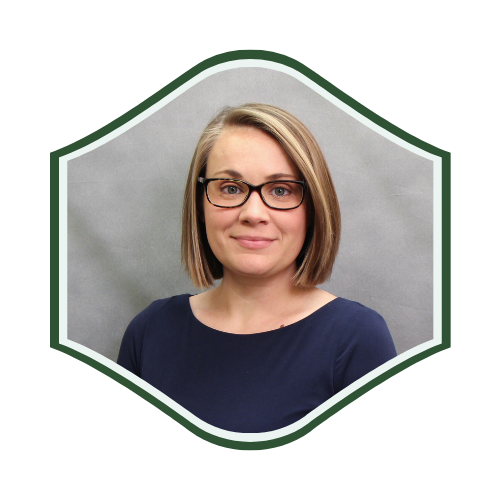
From Theory to Success!: Cultivating Positive Outcomes for the FASD Community
Time: Friday, June 16, 2023 at 3:30 pm
Speaker: Emily Rusnak, Ph.D., CCC-SLP
Emily Rusnak, Ph.D., CCC-SLP and her husband, Bill, are parents to a young adult with an FASD. Emily joined the MCFARES (Michigan FASD United affiliate) Board in 2016 and has been involved with FASD advocacy and training efforts at the state and national levels since that time.
Emily is currently the vice president of MCFARES, Michigan’s FASD United affiliate, the founder and project manager of the FASD Collaborative Project, has served on FASD United’s Executive Council, and is also the founder of FASD Direct, a new FASD advocacy, consultation, technical assistance, and training practice.
As part of her work with the MCFARES Board of Directors, Emily is currently spearheading an effort to provide a wide range of enrichment activities to the FASD community that focus on building strengths of individuals with an FASD and their families. These services will be available virtually and are anticipated to be open to all individuals who are neurodiverse and their families.
Through generous funding from the state of Alaska and FASD United, Emily is working through the FASD Collaborative Project to increase the number of freely available evidence-based FASD webinar resources, special interest groups on FASD, support groups, and enrichment activities. For more information on these resources or how your organization can participate, please visit at www.fasdcollaborative.com.
Through her private consultation work, Emily and her colleague, Dr. Elizabeth Cleveland, are currently focused on creating a streamlined process for assisting families and providers with development of their own neurobehavioral profile for individuals with an FASD. This process will allow families and providers to better represent the strengths and needs of individuals with an FASD using existing data sources, to support improved team alignment with evidence-based practices from the field of FASD.

Building Capacity for FASD Diagnosis & Care
Time: Saturday, June 17, 2023 at 8:40 am
Speaker: Lynn L. Cole, DNP
Lynn L. Cole, DNP is an Assistant Professor at the University of Rochester School of Nursing as well as Associate Division Chief & Director of Clinical Services, Division of Developmental & Behavioral Pediatrics at the Golisano Children’s Hospital with University of Rochester Medical Center. After many years as a nurse practitioner treating children with autism, cerebral palsy, and other disabilities in the University of Rochester’s Division of Developmental and Behavioral Pediatrics, Lynn had the opportunity to collaborate with FASD researcher Christie Petrenko and start the first multi-disciplinary FASD diagnostic and treatment clinic in Upstate NY in 2016. Here, Lynn and her team work to rapidly increase capacity for diagnosis of children across NY State by utilizing a tiered evaluation model and incorporating Nurse Practitioners and psychology trainees into diagnostic and treatment systems.
Lynn’s clinical work, teaching, and research is focused on optimizing capacity for diagnosis and treatment for people impacted by prenatal alcohol exposure. Lynn currently teaches about FASD in the University of Rochester’s School of Nursing and Rochester’s LEND training program. In clinical services, Lynn conducts FASD diagnostic evaluations, provides ongoing subspecialty medical care to children with FASD, provides evaluations in a residential treatment facility, and consults providers across NY State about the care of children with FASD.
With the support and collaboration of the University of Rochester’s UCEDD (Strong Center for Developmental Disabilities), Lynn led the first known “ECHO FASD”, a virtual telementoring program teaching primary care providers and community clinicians from Upstate NY the skills to diagnose and treat children with FASD. Lynn and her team have gone on to replicate this program twice for clinicians across the county of Chile, and more recently for clinicians across the US.
Lynn is currently a part of a NIAAA funded Collaborative Initiative on Fetal Alcohol Spectrum Disorders (CIFASD) project studying two interventions to increase skills of mental health providers to diagnose and treat individuals with FASD. She is also involved in NY State legislative advocacy to include FASD as a developmental disability in NY State law. She is a member of the New York State Interagency Workgroup on Fetal Alcohol Spectrum Disorder. Lynn is a principal investigator of a number of grants related to the care of children with developmental disabilities, including a PCORI-funded grant studying the treatment of ADHD in children with autism, a study looking at a biomarker of autism, and a project utilizing Quality Improvement methodology to improve care for children with autism. Lynn is also on a NY State Developmental Disabilities Planning Council grant to build capacity of Emergency Department and inpatient nursing staff of hospitals across NYS to better support the medical, social, and mental/behavioral health needs of individuals with Intellectual and Developmental disabilities. Lynn also belongs to the Scientific Advisory Review Committee at Autism Speaks.
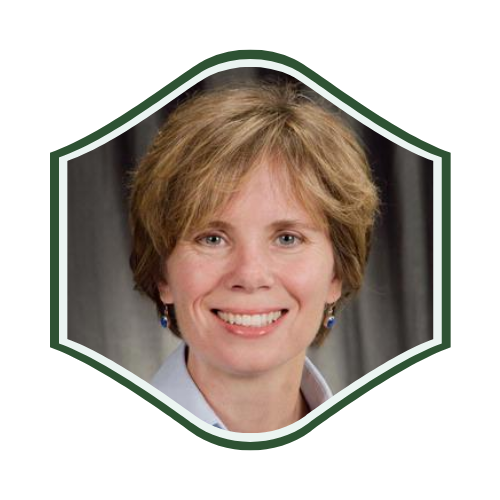
Speaker: Tiffany Lepard Tassin, M.S., C.G.C.
Tiffany Lepard Tassin, M.S., C.G.C. has two sons with an FASD (ages 8 and 9). Professionally, she is a Certified Genetic Counselor who previously worked with children referred for an evaluation for FASD at Arkansas Children’s Hospital. She currently works as an Assistant Program Director and Assistant Professor at University of Arkansas for Medical Sciences. Tiffany also works at the Specialty Diagnostic Resource Center through the Arkansas & Mississippi LEND program.
Tiffany volunteers with the Arkansas None for Nine program. She also presents about FASD to foster and adoptive parents.

Self-Advocate Perspectives and Lessons Learned from Lived Experience
Time: Saturday, June 17, 2023 at 10:15 am
Facilitator: David Deere, MSW, MTh
Mr. Deere serves as the chair of the FASD Special Interest Group for the Association of University Centers on Disabilities. He is now the Co-director of Specialty Diagnostic Resource Center, where individuals are seen to diagnose or rule out Fetal Alcohol Spectrum Disorders (FASD). He serves as the treasurer for Arkansas’s affiliate of FASD United, Arkansas None for Nine, and is a member of the FASD United Affiliate Executive Council.
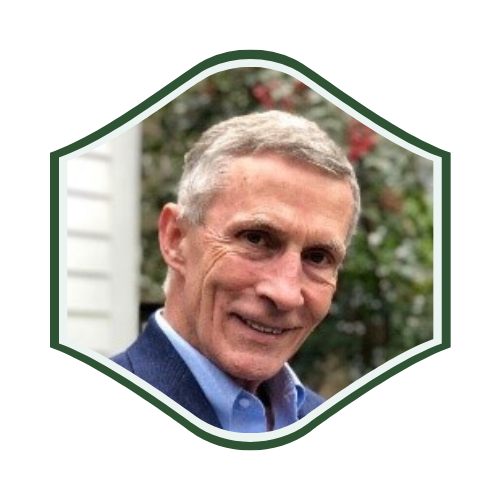
Panelist: Ms. Rebecca Tillou
When she was 33 years old, Rebecca Tillou found her birth mom, and discovered through her friends that she was an alcoholic while pregnant with Rebecca. After this discovery, Rebecca’s mom received an informational pamphlet on FASD from the adoption agency Rebecca was adopted from. Rebecca felt that she had many of the characteristics listed in the pamphlet. The pamphlet explained so much of her entire life! Rebecca submitted her medical history and baby photos to a genetic pediatrician who diagnosed her, at the age of 34, with Fetal Alcohol Syndrome.
After receiving a diagnosis, Rebecca began self-advocating and learning everything she could about FASDs. She is now a public speaker and advocate for those with an FASD and their families. She partnered with FASD United in 2021 to start the RunFasd Virtual 5k, a worldwide individual and team run/walk/bike/roll to bring awareness to Fetal Alcohol Spectrum Disorders. This September will be the third year of RunFASD. To learn more, visit www.runfasd.org.
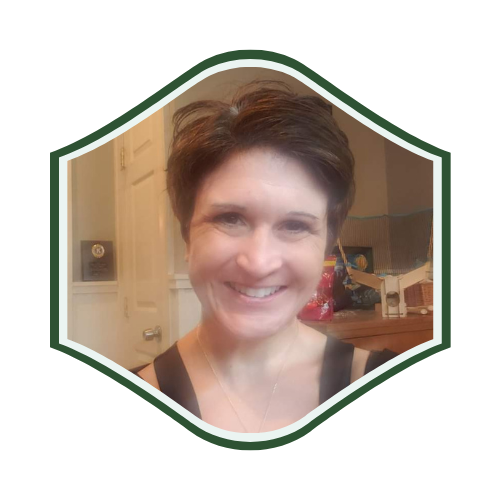
Panelist: Emily Hargrove, MPhil, PhD Candidate
At one year of age, Emily Hargrove was diagnosed with fetal alcohol syndrome, a life-long, full-body diagnosis from a Vanderbilt Clinic. Although she received a grim prognosis from doctors and was told she would likely never succeed in school, believing God always has something bigger for each of us, she decided to become more than a statistic. She now uses her voice to empower others who, too, have felt disenfranchised and her God-given love of learning to research the very thing with which she has been diagnosed.
For 15 years, Emily has traveled extensively as an educator, self-advocate, and speaker sharing her personal story of adoption, faith, FASD, and resiliency as well as research. As a member of the International Adult Leadership Collaborative of the FASD Changemakers (ALC), Emily has the honor of partnering with changemakers across the globe (presently 7 countries), building partnerships and alliances that aim toward strengthening the voices of adults with fetal alcohol spectrum disorder (FASD), creating environments that cultivate inclusion and mitigate stigma. In 2020, Emily co-authored an article published in the Routledge Handbook of Social Work and Addictive Behaviors on the chronic healthcare implications of adults with an FASD, and is currently co-authoring a second study on the quality of life of adults with an FASD.
She is a founding member of the first national self-advocacy network, Self-Advocates with an FASD in Action (SAFA), and is a former expert panel member for SAMHSA’s FASD Center for Excellence, co-authoring treatment and intervention protocols implemented throughout the United States. Partnering with state affiliates of FASD United (formerly NOFAS) as well as the Arc of the United States, Emily has developed and facilitated presentations and training for various audiences. Currently, along with fellow ALC members, Emily is partnering with the University of Rochester to develop an app with an aim to help adults with FASD manage their health.
Emily graduated Summa Cum Laude with a Bachelor’s in Psychology and Counseling and minoring in Christian Ministries (B.S.), holds a Master’s of Philosophy in Psychology (M.Phil.), and presently, is a Doctor of Philosophy in Psychology (Ph.D.) candidate with a dissertation focus on FASD and spiritual development. Emily is a certified affiliate and member of the American Philosophical Practitioner Association (APPA) as a philosophical counselor. Emily owns Emily Hargrove Consulting – Where Faith and FASD Collide offering speaking services, philosophical counseling, and an FASD-inspired clothing and accessory line.
Serving alongside her husband, Jace, as the next-generations pastors at their church, they are fervent about lighting the fire within their students. Aa a former Miss Illinois Outstanding Teen, Emily serves on a local Miss America Scholarship Pageant board. She enjoys playing classical piano and Native American flute. Growing up on a farm, Emily is enamored with all things outdoors, particularly horseback riding. In her spare time, when she is not working on her dissertation or wrestling with her fun-loving one-year-old, she enjoys studying complementary and alternative approaches to well-being. This can be evidenced in her professional work as a former chiropractic assistant/massage therapist, to a passion for Native American/holistic remedies, and to her pursuit of philosophy as a mode of healing.

Panelist: Ms. Helen Simpson
Helen Simpson was diagnosed with FASD and ARND at the age of 11. Now at 33, Helen resides in Portland, OR with her 4 year old son, William. Her passions as a self-advocate have led her to a career as an author, public speaker, and storyteller. Her strengths are sharing her journey and experiences through her storytelling, writing, creativity, persistence, and determination.
Helen has worked with many FASD community affiliates such as NOFAS, Proof Alliance, Hawaii Center of Excellence, Red Shoes Rock, and FASCETS. Her current projects include being the secretary and board member of FASCETS, maintaining her website and blog Love Me Enough. Faces of Fetal Alcohol, and working on publishing her 3rd children’s book on Amazon about FASD.
Her success in life is because of her relentless persistence. In her advocacy, community outreach and support, employment, pursuit of college degree, and motherhood, she has faced everything head on with determination. Through every setback, obstacle, addiction, struggle with mental health, constraint, limitation, barrier, failing, flaw, and loss, she has remained persistent in overcoming it all.
Fun Fact: Helen loves chasing waterfalls in the PNW with her son, William.
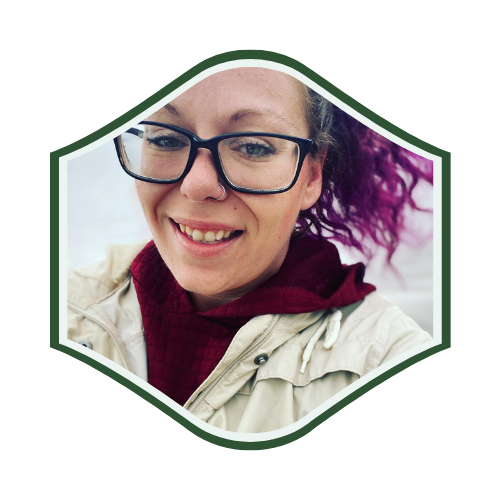
Engagement Motivation & Capacity Building
Time: Saturday, June 17, 2023 at 1:30 pm
Facilitator: David Deere, MSW, MTh
David Deere retired from Partners for Inclusive Communities (Partners) at the University of Arkansas, where he served as the Director. Partners is the University Center for Excellence in Developmental Disabilities (UCEDD) for Arkansas, which is the same role as the Human Development Center, LSUHSC has for Louisiana. Mr. Deere serves as the chair of the FASD Special Interest Group for the Association of University Centers on Disabilities. He is now the Co-director of Specialty Diagnostic Resource Center, where individuals are seen to diagnose or rule out Fetal Alcohol Spectrum Disorders (FASD). He serves as the treasurer for Arkansas’s affiliate of FASD United, Arkansas None for Nine, and is a member of the FASD United Affiliate Executive Council. He previously worked on FASD projects that were funded by the Centers for Disease Control and Prevention and Substance Abuse and Mental Health Services Administration. He is a social worker by training and a retired member of the United Methodist clergy. In retirement, David enjoys spending time with his wife, daughter, and son, along with his four grandchildren – at least he usually enjoys them, when they are not bickering. He also enjoys travel with his family and watching Arkansas Razorback Athletics – even when they are losing to LSU.


 myLSUHSC
myLSUHSC